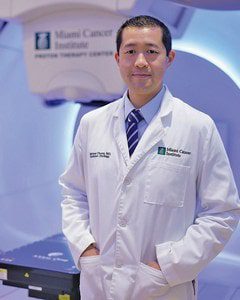|
Getting your Trinity Audio player ready...
|

Pancreas cancer is a leading cause of cancer-related death ― although an advanced type of radiation therapy at Miami Cancer Institute, part of Baptist Health South Florida, is offering patients the possibility of living longer.
Michael Chuong, MD, medical director of Radiation Oncology at the Institute, presented Miami Cancer Institute’s long-term results of MR-guided stereotactic ablative radiation therapy (SABR) at the European Society for Radiotherapy and Oncology (ESTRO) 2021 conference in Madrid on Aug. 29.
Typically given after chemotherapy, MR-guided SABR delivers about twice the radiation dose that can be safely delivered over five days with conventional radiation therapy machines and this may result in better treatment response. MR-guided SABR is an outpatient, painless and non-invasive procedure that is completed with little to no patient side effects.
In 2018, Miami Cancer Institute became the second institution in the United States to offer MR-guided SABR on the MRIdian Linac and has since been recognized as a global pioneer in the development of this novel technology. Real-time MRI scans throughout treatment permit continuous tracking of the pancreas tumor. This enables an unprecedented high dose of radiation to be delivered in only five days. This advanced imaging ensures millimeter accuracy and allows for daily treatment modification to account for changes in the patient’s internal anatomy, thus further improving treatment accuracy and safety.
“We were among the first to publish MR-guided SABR results for inoperable pancreas cancer in 2019 that demonstrated encouraging early results,” Dr. Chuong said. “Now, with longer followup, we are encouraged that benefits of MR-guided SABR not only have been maintained over several years, but especially because they have been achieved without significant side effects in nearly all patients.”
The median survival time for inoperable pancreatic patients receiving chemotherapy and standard radiation therapy is only about 12 to 15 months. In the study results presented by Dr. Chuong, the median survival was significantly longer at 21 months. Many patients were still alive several years after SABR.
“These exciting results provide additional support for ongoing and future clinical trials of MR-guided SABR for inoperable pancreas cancer, several of which are being developed at Miami Cancer Institute and will be opened at other institutions in the United States,” he said.
More than 60,000 people in the U.S. will be diagnosed with pancreatic cancer this year, according to the American Cancer Society. While the death rate for some cancers has dropped significantly in the last decade, it has not improved for pancreas cancer. With symptoms that mimic other ailments, it often goes undetected until it is in an advanced stage. Because pancreas cancer routinely involves important blood vessels in the abdomen it can be difficult to remove surgically. As a result, both chemotherapy and radiation therapy are important in the management of such patients, some who may eventually become candidates for surgery.
“We understand how devastating a diagnosis of pancreatic cancer can be for patients and their families,” Dr. Chuong said. “We are very excited that our work is advancing cancer care, possibly contributing to longer survival rates while maintaining a high quality of life for our patients. Our hope, as we conduct more trials, is that we see these targeted therapies having huge benefits to patients with many other types of cancer.”
Miami Cancer Institute brings to South Florida access to personalized clinical treatments and comprehensive support services delivered with unparalleled compassion. No other cancer program in the region has the combination of cancer-fighting expertise and advanced technology — including the first proton therapy center in South Florida, Latin America and the Caribbean, and one of the only radiation oncology programs in the world with each of the newest radiation therapies in one place — to diagnose and deliver precise cancer treatments that achieve the best outcomes and improve the lives of cancer patients.
The Institute offers an impressive roster of established community oncologists and renowned experts, clinical researchers and genomic scientists recruited from the nation’s top cancer centers. Selected as Florida’s only member of the Memorial Sloan Kettering Cancer (MSK) Alliance, Miami Cancer Institute is part of a meaningful clinical collaboration that affords patients in South Florida access to innovative treatments and ensures that the standards of care developed by their multidisciplinary disease management teams match those at MSK.
Miami Cancer Institute is part of Baptist Health South Florida, the largest healthcare organization in the region, with 11 hospitals, more than 23,000 employees, 4,000 physicians and 100 outpatient centers, urgent care facilities and physician practices spanning across Miami-Dade, Monroe, Broward and Palm Beach counties.





